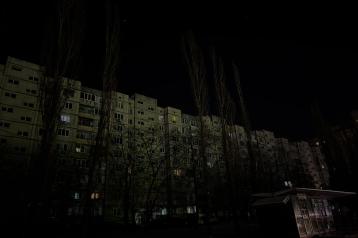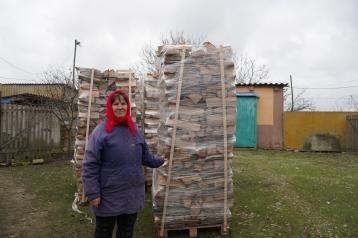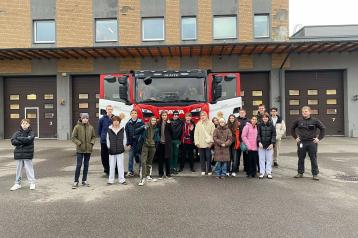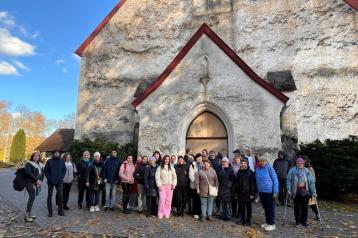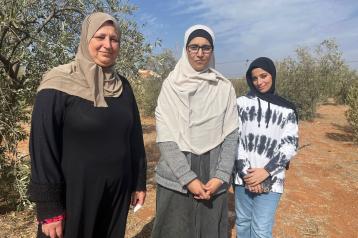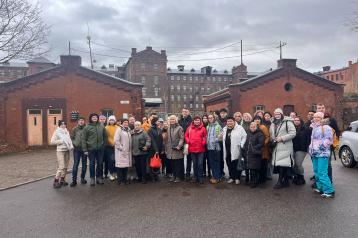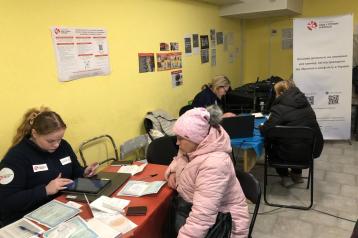Countries
- In Estonia, training sessions for young people with a refugee background, called Start Smart, have begun.
- In Estonia, we held a Mother's Day campaign, A Gift for Two Mothers, aiming to support mothers living in Ukraine with hygiene products.
- In Estonia we are running the MindSpring group based programme for people with refugee backgrounds to help them adjust to life in a new country.
- In Ukraine we are launching a mental health support hotline for Ukrainians both in Ukraine and abroad to support the people affected by the war.
- In the Tavush region of Armenia, work continues on alleviating water shortages, supporting climate resilience, and providing environmental education for children, using water- and energy-efficient agricultural solutions developed in Estonia.
- In Georgia, we support Ukrainian refugees through multi-purpose cash assistance to help people cope and better manage their daily lives.
- In Jordan, we are supporting vulnerable families, particularly those headed by women. We are training both local women and women with a refugee background from Syria to grow food for their families in hydroponic greenhouses.
Ukraine
We provide cash-based assistance, which allows people affected by the war to purchase food, medicines, hygiene products, and other essentials. As of now, we have provided cash-based assistance to more than 300,000 conflict-affected people, worth more than 56 million euros. Cash assistance is provided for three months, with the support of 3600 Ukrainian hryvnias per household member per month, equivalent to about 80 euros. Registration for assistance is carried out through Estonian Refugee Council's local registration points or via the online application platform. Currently, our focus is on assisting those in need in frontline areas in Zaporizhzhia, Donetsk, Luhansk, Kharkiv, and Kherson oblasts. The programme is funded by the European Union and the Ministry of Foreign Affairs of Estonia where Acted is the lead partner.
We are monitoring the impact of the support we have previously provided through emergency livelihood assistance. The next phase of the programme will start shortly in Poltava, Kirovohrad, Cherkasy, Zaporizhia, Dnipropetrovsk, and Donetsk regions. The support is aimed at starting or continuing economic activities to improve self-reliance. We are supporting sectors related to agriculture, livestock farming, food production, and various services. The amount of support is around 700 euros. The programme is funded by the European Union, BHA/USAID, and the Ministry of Foreign Affairs of Estonia.
We are launching a mental health support hotline for Ukrainians both in Ukraine and abroad to support the people affected by the war. The work of the NPA Psychological Hotline is implemented in partnership with the National Psychological Association of Ukraine and made possible thanks to funding from ESTDEV — Estonian Centre for International Development.
As part of the Three Years Too Many campaign, we raised nearly 20,300 euros in donations to support Ukrainians who were already in vulnerable situations before the war: single parents, large families, people with disabilities, and the elderly. The dissemination of collected funds will start in June.
At the end of April, the Mother’s Day campaign A Gift for Two Mothers was launched to support mothers living in the Zaporizhzhya region of Ukraine with essential hygiene supplies. Read more and explore the donation platform on the website of the Estonian Refugee Council.
Estonia
During April, a portrait exhibition travelling Estonia titled Voices from Crises: Stories of Displaced People was displayed on Vabaduse Boulevard in Tartu, showcasing the stories of refugees living in Estonia. The exhibition was opened in Tallinn last spring and moved later to Pärnu.
The Start Smart training programme for young people, in collaboration with Haaga-Helia University of Applied Sciences in Finland, is currently underway. The employability programme supports the competitiveness of people with a refugee background in business and the labour market through the learning of artificial intelligence. The programme is funded by the Interreg Baltic Sea Region Programme with support from the European Regional Development Fund.
Entrepreneurship programme Boost, helping participants with refugee backgrounds develop or relaunch their businesses is ongoing. The programme is supported by Wise.
We are running the Edge Up employability programme, aimed at people with a refugee background who wish to enter the job market or move on to a more suitable position. So far, 11 groups have completed the programme in Estonia and Latvia each. The final training sessions are scheduled for May, and all groups are fully formed. In Latvia we have partnered up with a local organisation Shelter Safe House. Each month, 10–12 people participate in the training. The employability programme is funded by the Interreg Baltic Sea Region Programme, with support from the European Regional Development Fund.
We conduct monthly adaptation support training sessions on various subjects, including use of e-services, parenting, education system, adaptation of pensioners, legal matters, entrepreneurship, medical and social system, labour market, as well as legal foundations and residence permits. The training sessions take place across Estonia, both in face-to-face and online formats. In April, 290 people participated in the training sessions. Since 2022, a total of over 11,000 people have taken part in these trainings. There continues to be the highest demand for training on rights-related topics and housing acquisition.
We provide counselling by appointment at the Estonian Refugee Council office (Vambola 6, Tallinn) every day from 10 am to 5 pm. Our information hotline is open to all refugees, as well as institutions and individuals assisting them, at +372 5881 1311 (Monday to Friday from 10 am to 5 pm), and via email at counselling@pagulasabi.ee. Additionally, counselling services are available on Viber, WhatsApp, and Telegram at +372 5464 0007.
We organise regular group activities and community events across Estonia. In April, more than 360 people took part in community activities across Estonia. Several community events were held to support language learning, youth engagement, and community integration. For example, a spring celebration was held for refugees in the Valga and Võru regions, and a cooking evening was organised for young people in Narva. Community activities are supported by UNHCR – the UN Refugee Agency.
We are running the MindSpring group based programme for people with refugee backgrounds to help them adjust to life in a new country. In May, a new group for parents will start in Tallinn. Later in the year, we will start several groups for young people across Estonia. The programme is being implemented with the support of the Estonian Ecumenical Relief Organization (EERO Canada), funded by donations collected in Canada and the United States.
Armenia
In Armenia, we are establishing hydroponic greenhouses at three schools in the Tavush region and supporting the adoption of water- and energy-efficient agricultural solutions developed in Estonia. Through the programme, we help schools cope with the impacts of climate change and ensure food security in water-scarce conditions. At the same time, the programme supports environmental education for children and increases student engagement with agricultural and environmental topics. The programme is financed by the Ministry of Climate from international cooperation funds.
Thanks to funding from the European Union, we are launching four community councils in Armenia to enable people with refugee backgrounds to voice their concerns, advocate for solutions to their problems, and take part in decision-making processes that affect them. Similar community councils have been established in both Estonia and Georgia. In addition, we are running self-help groups that support the mental well-being of people with refugee backgrounds. Throughout April, self help group meetings were held in Artashat and in Gyumri and covered topics such as digital literacy, media literacy, mental well-being, confidence building, SWOT analysis, coping mechanisms, and more. Four more sessions are planned for May. The programme is funded by the European Union.
Georgia
We are launching a new programme in Georgia to strengthen local non-governmental and civil society organisations. Through this new initiative, organisations will improve their capacity to navigate regulatory challenges, secure the funding needed for their operations, and promote cooperation across different regions. In April, we launched the call for experts who will host the trainings, and participants. The programme is funded by ESTDEV – Estonian Centre for International Development.
We continue supporting Ukrainian refugees in Georgia through multi-purpose cash assistance. We help Ukrainian refugee households to cope better with daily life. The one-off support amounts to 265 lari per person, capped at a maximum of three household members (approximately 93 euros). The programme is supported by the Estonian Ministry of Foreign Affairs.
Jordan
In Jordan, we support the self-sufficiency of vulnerable female-headed households through smart and climate-friendly agricultural practices. 12 out of 40 women will receive startup grants in the form of fully constructed hydroponic greenhouses, enabling them to secure food for their families and generate income through produce sales. The project also extends its reach to four female-led community organisations, providing them with hydroponics training to promote water-efficient agricultural methods across the region. The activities of the Estonian Refugee Council in Jordan are supported by ESTDEV – Estonian Centre for International Development.
Syria
Estonian Refugee Council will be opening a representative office in Syria in the coming months to begin operations aimed at supporting people affected by the civil war and contributing to the country's reconstruction. The Estonian Refugee Council has been involved in regional support for Syria since 2018 and has also worked to promote the long-term self-sufficiency of Syrian refugees in Jordan and Lebanon.

